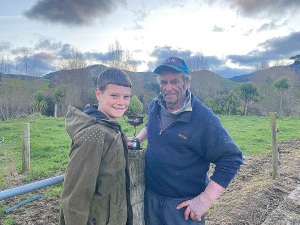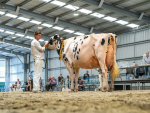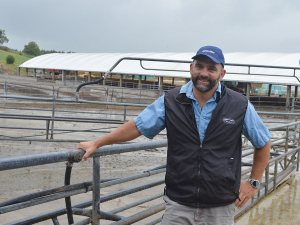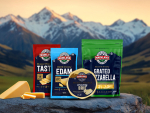Kevin and Alison Hull have been the heart and soul of this 99ha dairy operation since 1985, but their connection to the land runs much deeper than that - reaching back nearly a century when Alison's grandfather first started farming the property in 1927.
Today, the couple peak milk a 200-strong herd of Holstein Friesian cows on an 80ha effective milking platform, a testament to both their commitment to the breed and the environment they nurture.
The farm's history is rich with transformation and adaptation. Alison's father, who preferred Jersey cattle, owned the property until Kevin and Alison purchased it from him in 1999, after 50:50 sharemilking for several years.
Kevin quickly saw the potential for Holstein Friesians, and they became the cornerstone of the Hull's operation.
Awakare Farm isn't just a business - it's a family affair. Kevin, Alison and their daughter Jude work together during the busiest times, with their son Johnny, who previously worked on the farm, now contract milking on another property. Their other daughter, Abby, is also involved in farm operations.
The next generation is already stepping up to carry the torch, with 12-year-old Jimmy, one of Kevin and Alison's eight grandchildren, taking an active role on the farm. Jimmy's passion for farming has blossomed, a sure sign that the Hull family's legacy is secure.
"When we see three generations in the cowshed, remembering the farm has been in the family for 100 years is amazing," Jude says.
The Hulls operate a pasture-based system 3 farm, utilising silage and supplementary feed such as turnip, chicory and kale to maintain cow health and milk production. The farm also incorporates a summer cropping programme to bolster the quality of pasture and boost milk production during drier periods. The cows are wintered off on a grazing block, with a 30-hectare runoff down the road serving as home to dry stock and springers.
The herd, which produces aroun 400kgMS per cow, is the backbone of the farm. While production can fluctuate depending on weather conditions, the Hulls remain optimistic about their herd's performance.
"We can have some dry summers and wet springs here which affect the production target, but 400kgMS/cow is what we aim for," Abby says.
Calving starts July 27 and around 50 replacements are kept annually. Bull calves are either sold at four-days-old or raised by Abby until 100kg and then sold.
"That's another reason we like the Holstein Friesian breed - there is a good market for Holstein Friesian calves, so there is no waste," Jude says.
They carefully breed for fertility and production, ensuring that high-producing cows that are easy to manage remain at the heard of the operation.
Holstein Friesians are a breed that Kevin and Alison have stuck with for good reason.
Known for their study build and ability to work well on rolling hills, these cows are not only productive but are what the family enjoys working with.
"We very much like the breed of cow and have no plans to change that," Abby says.
Careful Selection of Bulls
The family's careful selection of bulls each season plays a key role in maintaining the herd's desirable traits.
"Production is important, but not the be-all and end-all," Abby Hull says.
Fertility and temperament are just as vital, with the family selecting for cows that are neither too large nor too difficult to manage.
“We’re not breeding massive Holstein Friesians,” Abby says. “If they get too heavy, we will get pugging damage on our soils and not be able to run the stocking rate we want to suit our pasture growth curve. We want a practical animal that can get back in calf quickly and has good conversion efficiency.”
The Hulls’ dedication to the land extends beyond their herd. Recognised for their commitment to sustainability, Kevin, Alison, and Johnny were awarded the Ballance Agri-Nutrients Soil Management Award, the DairyNZ Sustainability and Stewardship Award and the Greater Wellington Regional Council Award in 2022.
Their conservation efforts, particularly in preserving Awakare’s waterways, have enhanced the property’s biodiversity. By planting native trees and protecting wetlands, the Hulls have created a haven for native birds and fish, further enriching the farm’s ecosystem.
“We want to protect the farm for the future generations coming through,” Abby explains.
Alison has long been a champion of planting waterways, raising seedlings in her nursery to later transplant on the farm. The Hulls’ low application of nitrogen, coupled with their ability to spread effluent over a large area, has helped reduce nitrogen leaching and improved soil health. They also employ minimum tillage techniques and direct drilling, further reducing their environmental footprint.
Jude’s husband Willy, the principal of a local school, has even brought students to the farm to help with planting efforts, giving them hands-on experience in environmental conservation.
“It’s always been a lovely natural habitat, but now there are even more birds, and Mum regularly feeds the pet eels in the creek,” Abby says.
With the next generation already showing a deep connection to the farm, the future of Awakare Farm looks bright. Jimmy in particular is following in his family’s footsteps.
His interest in showing cows began with his school pet day and since then, he’s taken three calves to pet days, with many first placings in care and condition and leading.
At a local A&P Show he took home first prize in leading, dairy type and care and condition. And the trophy he received was especially meaningful to Jimmy, as it bore the names of Kevin and his brothers from their own showing days.
As the Hull family celebrates a century on their farm, they continue to look forward to what the future holds. While expansion is always a possibility, they remain committed to running a sustainable, efficient operation that allows the entire family to be involved.
“I like the idea that it is a place where the kids can come and learn,” Abby says. “On a small farm, you have to do all the tasks, and it’s a good place to gain a strong farming knowledge base.”
Farm Facts
Owner: Kevin & Alison Hull
Location: Carterton, Wairarapa
Farm size: 99ha (80ha milking platform)
Cows:200 registered Holstein Friesian
Production: 80,000kgMS
Stud name: Awakare


















